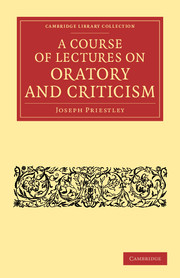
-
Select format
-
- Publisher:
- Cambridge University Press
- Publication date:
- 05 October 2014
- 24 October 2013
- ISBN:
- 9781139862776
- 9781108066075
- Dimensions:
- Weight & Pages:
- Dimensions:
- (216 x 140 mm)
- Weight & Pages:
- 0.5kg, 396 Pages
You may already have access via personal or institutional login
Book description
While a tutor at Warrington Academy, the polymath Joseph Priestley (1733–1804) established himself as a leading grammarian and educational theorist, producing the influential Rudiments of English Grammar (1761) and A Course of Lectures on the Theory of Language and Universal Grammar (1762), both of which are reissued in this series. In 1762 he also delivered these lectures on rhetorical theory, arguing that the purpose of rhetoric is moral formation. Priestley was deeply influenced by associationism, a theory of mind developed by John Locke and David Hartley. This claims that all complex ideas develop from simple ones, which arise purely from sensory impressions. The orator's role, then, is to form the right associations between impressions and ideas in a listener's mind. Informed by this theory, these thirty-five lectures re-evaluate the classical rhetorical components of topic, method and style. First published in 1777, the work is reissued here in its 1781 Dublin printing.
Contents
Metrics
Full text views
Full text views help Loading metrics...
Loading metrics...
* Views captured on Cambridge Core between #date#. This data will be updated every 24 hours.
Usage data cannot currently be displayed.
Accessibility standard: Unknown
Why this information is here
This section outlines the accessibility features of this content - including support for screen readers, full keyboard navigation and high-contrast display options. This may not be relevant for you.
Accessibility Information
Accessibility compliance for the PDF of this book is currently unknown and may be updated in the future.


